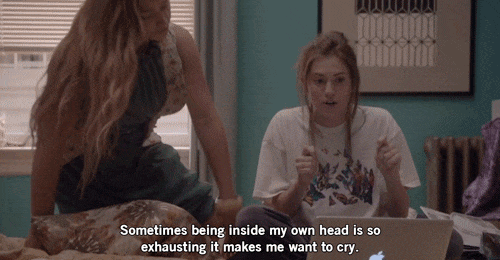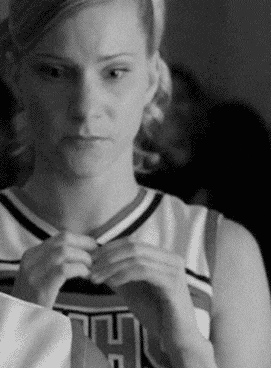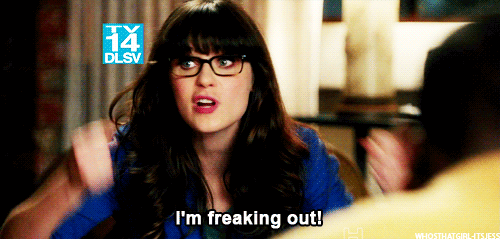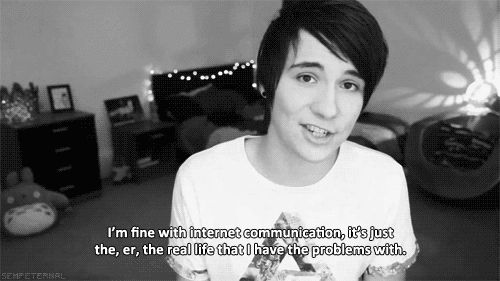Social anxiety disorder is where social interactions cause irrational fear and anxiety. People with social anxiety suffer from anticipatory anxiety, distorted thinking, avoidance from social situations or even physical symptoms like shaking or pounding heart. I was diagnosed with social anxiety in my freshman year of college but I always dealt with it growing up. People always classified it as being shy and the anxiety being just a phase that I had to grow out of or sleep off. I've struggled with it for so long that I know what my triggers are and what cause me to have more anxiety. Crowds, confrontation, groups of strangers, and being the center of attention causes my mind to panic and for me to avoid social interaction a lot of the time. With dealing with social anxiety, I've noticed that a lot of people either don't fully understand it, are insensitive about it, or act like it doesn't exist.
1. "Your social anxiety is affecting/bothering me. It's really annoying"
Please never say this to someone who is struggling with social anxiety . People who suffer from mental disorders already feel like they are a huge burden and annoyance to everyone around them. This can often cause us to shut some people out, and cause us to have more anxiety. We already feel bad that we have to ask you to be here for us, so please don't mention how hard it is for you. We honestly can't control it, so please just be there for us.
2. "You just need a push, some tough love and you'll get over it"
Although this may have some good intentions and maybe you think you're helping us face our fears, but it just causes us to panic even more because you're putting us on the spot. It makes us uncomfortable and can give us a full panic attack at any time. If we don't want to go somewhere or do something, please do not think forcing us/pushing us is going to help. Either ease us slowly into it or let us do it by ourselves when we're ready.
3. "Just come to a party/somewhere with us"
If we don't accept the invitation, please don't think we're trying to be difficult or rude. It's just we know what triggers us, and being surrounded by people that we don't know and are uncomfortable around causes us to panic. Yes, it can be frustrating to be on the receiving end of things like plans being cancelled at the last minute, but if it's the result of social anxiety. My social anxiety causes my mind to overthink and then panic in very large social situations. I either feel the need to make an excuse to leave early or I’ll follow my friends like a lost puppy until I get overly self-conscious about it and end up apologizing constantly. If I turn down an invite or cancel on plans, it’s not anything personal, I’m not trying to be mean and it certainly doesn’t mean that I don’t love you – its just the party or the outing might be too overwhelming for me and it can trigger an anxiety attack.
4. "Just get over it, it's not real"
To me and a lot of other people, it's a very real thing that we have to deal with everyday. Saying "Just get over it" is belittling a person's problems, and insinuating that it's easy for us. It shows that you don't care. Unless you suffer with it, you never fully understand how hard it is for us. The social anxiety can cause us to have trouble breathing, panic and just avoid any social interaction.
5. "Didn't I already say that to you?"
For people with social anxiety, it can feel like we're never right. There's an impulse/thought for us to constantly question ourselves and those around us, not because we want to annoy/doubt you, but we want to make sure we heard you correctly. To others, this can come across like we're annoying or unnecessarily asking for clarification or that we weren't paying attention. Just please be patient and clarify the information with us without thinking into it and taking it as an insult or sign of disinterest.
When helping someone with social anxiety disorder or any disorder, it is very important to put a bit of extra thought into what you say before you say it and just overall be there for the person. It does mean the world to us, when you try to understand rather than judge or yell at us. Some statements that are always safe are "Is there anything I can do to make it better?" "How can I help you?" "I'll be right here, if you want anything" "We don't have to, if you're uncomfortable" . It shows us that you really do care and want the best for us. We really do appreciate it.


























